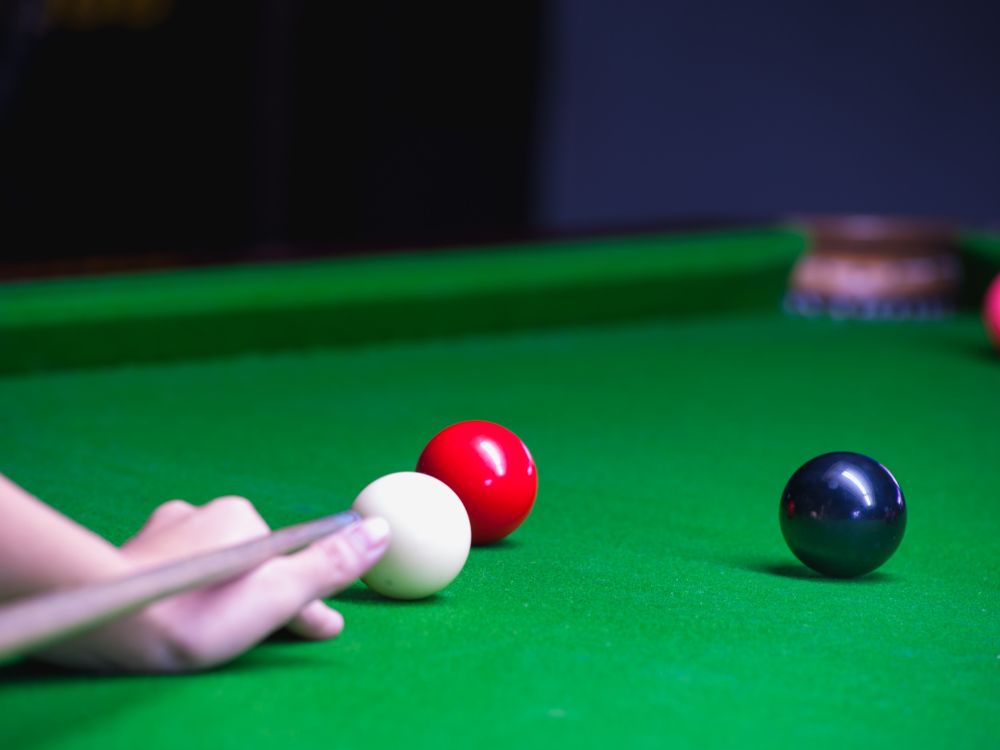In comparing the difficulty of snooker versus pool, it is generally agreed that snooker is the more challenging sport due to its larger table size, smaller pockets, and the more strategic gameplay. Although both games require a high degree of skill, the complexity of snooker often gives it the edge in difficulty.
Pool and snooker are both fascinating cue sports, each with unique aspects that engage different skill sets.
Exploring the nuances of these games can reveal why snooker is generally perceived as the more challenging sport.
In this article, we will delve into the intricacies of both sports, providing a comprehensive analysis of what makes each game unique and, ultimately, why snooker often holds the title of the “harder” game.
Let’s get started!

Is Pool Easier than Snooker?
On the surface, pool might seem like a simpler game.
The table is smaller, the balls are larger, and there are fewer of them compared to snooker.
Additionally, the pockets on a pool table are more forgiving than those on a snooker table.
The shape of the pockets in pool allows for easier potting of balls, and their larger size gives players a wider target.
However, pool has its own subtleties.
Strategy plays a key role in pool, especially in games like 8-Ball and 9-Ball, where predicting ball movements and controlling the cue ball are crucial.
Despite these complexities, the consensus is that pool is somewhat easier to learn and play than snooker, though mastering it still takes a considerable amount of time and practice.
Why is Snooker So Difficult?
Snooker is typically considered more challenging due to several factors.
Firstly, the size of a snooker table is significantly larger than a pool table, which means players need to cover more ground and make longer shots.
Additionally, the balls used in snooker are smaller and the pockets tighter, which makes potting considerably more difficult.
Moreover, snooker requires a higher level of strategy and foresight.
A player must think multiple shots ahead, planning their route around the table carefully.
Furthermore, the scoring system in snooker adds another layer of complexity, as players must pot balls in a specific sequence.
What is the Most Difficult Cue Sport?
While snooker is widely recognized as one of the most challenging cue sports, there are others that hold a comparable level of difficulty.
Three-Cushion Billiards, a form of carom billiards, requires the cue ball to hit at least three cushions before contacting the other balls, demanding an exceptional level of accuracy, control, and understanding of angles and speed.
Similarly challenging is Pyramid, a Russian game with 15 balls and very small pockets, and One-Pocket Pool, a pool variant where all balls must be pocketed into a single designated pocket.
Carom Billiards, played on a pocketless table, also requires extraordinary precision and control.
Despite the considerable difficulty of these games, due to the strategic requirements, precision in shot-making, and the unique challenges presented by its larger table and smaller pockets, snooker often comes out on top as the most complex and difficult cue sport.
Is Snooker Good for the Brain?
Yes, snooker is excellent for the brain.
Playing snooker can improve concentration, strategic thinking, and fine motor skills.
The game requires players to plan several steps ahead, which can enhance problem-solving abilities and spatial intelligence.
Furthermore, the need to calculate angles and distances can help improve basic mathematical skills.
The intense concentration required in snooker can also enhance mental endurance and resilience.
The Role of Technique in Snooker and Pool
In both snooker and pool, technique is paramount.
However, due to snooker’s larger table and smaller pockets, the game requires greater precision, often demanding a more refined technique.
In pool, a player can often “muscle” a shot using power, but in snooker, precision and finesse are key.
The need for a correct stance, a smooth cue action, and precise aim makes snooker a more technically demanding game.
Snooker vs Pool: The Mental Challenge
Apart from the physical and technical aspects, the mental challenge in snooker is another factor that makes it more difficult than pool.
Snooker demands a high level of mental toughness.
With frames that can last over an hour, players must maintain concentration, patience, and composure throughout.
Furthermore, the need to strategize several shots in advance adds to the mental complexity of the game.
Pool also requires strategic thinking, but not quite to the same extent as snooker.
In conclusion, while both snooker and pool offer their unique challenges and require distinct skill sets, snooker is often seen as the harder game due to its larger table, smaller pockets, and more demanding strategic and technical requirements.
However, both games are intriguing in their own right,
More in Snooker
- Are Snooker Tables Heated? (Explained!)
- Can Snooker Players Change Cues? (Find Out!)
- Can Snooker Players Drink Alcohol? (Answered!)
- Can Snooker Players Hear the Commentators? (Revealed!)
- Can Snooker Players Wear Gloves? (Answered!)
- Can You Pot Two Reds in Snooker? (Find Out!)
- Do Snooker Players Wear Special Shoes? (Answered!)
- Do Snooker Tables Have Pockets? (Revealed!)
- Is Snooker Harder Than Pool? (Find Out!)
- What Are Snooker Balls Made From? (Answered!)